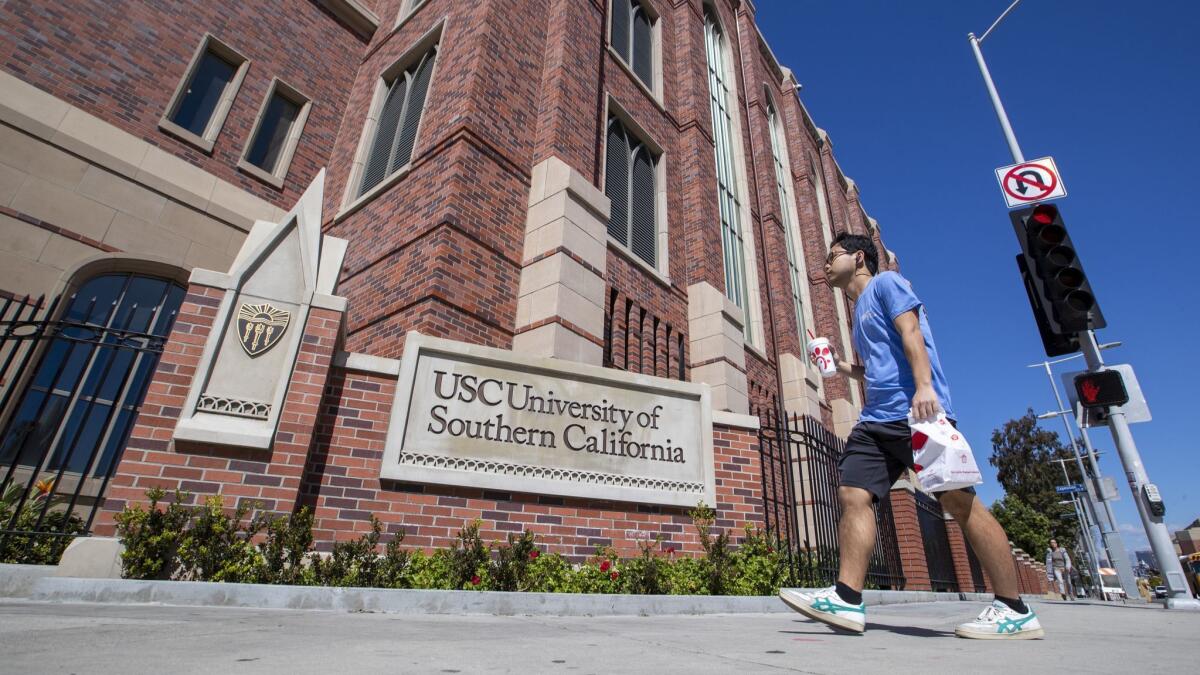College admissions scandal fallout: Stanford students sue UCLA, USC and Yale

- Share via
Two Stanford University students on Wednesday filed a federal class-action lawsuit against eight colleges ensnared in the largest college admissions scandal ever prosecuted, alleging that the rigged system denied them a fair chance to matriculate at the elite institutions and could tarnish their degrees.
Stanford, USC, UCLA, the University of San Diego, the University of Texas at Austin, Wake Forest University, Yale University and Georgetown University are named in the lawsuit, which seeks damages for any student who applied to one or more of the universities and was rejected between 2012 and last year.
The lawsuit came a day after federal prosecutors announced charges against 50 people, including celebrities, corporate executives, investment bankers, business owners, top-tier lawyers and even a bestselling author of parenting books for their alleged roles in an audacious scheme to get their children into elite universities by paying thousands dollars to have scores on college admissions tests altered and fabricating athletic prowess.
“Their actions were without a doubt insidious, selfish and shameful,” FBI Special Agent Joseph Bonavolonta said Tuesday. “And the real victims in the case are the hardworking students who did everything they could to set themselves up for success in the college admissions process, but ended up being shut out because far less qualified students and their families simply bought their way in.”
Erica Olsen and Kalea Woods, who both attend Stanford, allege they were among those cast aside in the admissions process.
Olsen had nearly perfect SAT and ACT scores and had participated in dance, later qualifying for the elite dancing squad at Stanford, when she graduated from high school. She applied to Yale in 2017 and paid an application fee of about $80, only to be rejected by the university, according to the lawsuit.
“Had she known that the system at Yale University was warped and rigged by fraud, she would not have spent the money to apply to the school,” the lawsuit states. “She also did not receive what she paid for — a fair admissions consideration process.”
Woods, who now attends Stanford, has a similar story, according to the lawsuit. She applied to USC in 2017 with stellar marks on her college entrance exams, paid the $85 application fee and was denied admission.
“At the time she applied, Woods similarly was never informed that the process of admission at USC was an unfair, rigged process, in which parents could buy their way into the university through bribery and dishonest schemes,” the lawsuit states.
The students also claim that since Stanford is linked to the scandal, their degrees may be tainted. One of their concerns is that prospective employers may now question whether they were admitted to the university on their own merits or whether their parents were willing to pay bribes to guarantee their admission, according to the lawsuit.
The students claim that the schools failed to properly oversee their admissions process and ensure that it was fair to all students.
The sweeping criminal investigation, which came to light earlier this week, alleges wealthy parents from different parts of the country sought out Newport Beach businessman William Singer with one overriding goal: to get their children into the best colleges. Singer, who owns the admissions company called the Edge College & Career Network, said he had built a “side door” into USC and other highly sought-after universities and could help their children walk through.
In phone conversations with parents secretly recorded by agents, Singer boasted he had helped more than 850 students of the wealthy and powerful to lie their way into colleges in just two years. Authorities said that in some of the cases known to investigators, the children were aware of the con carried out on their behalf, but that others were kept in the dark by their parents.
Singer ran his ploy through Key Worldwide Foundation, a charity he started in 2012, prosecutors said in court papers. The organization’s mission was “to provide education that would normally be unattainable to underprivileged students,” according to paperwork.
In reality, Singer used the foundation to collect payments from parents and pay bribes, court records show. Because they were writing checks — or in at least one case, transferring stock in Facebook — to a charity, parents were able to write off their payments to Singer as tax deductions, authorities said.
The charges stunned the upper echelons of American academia, heightening debate about the advantages the ultra-rich enjoy in accessing the country’s best colleges amid intense competition in which merit alone is not enough to ensure admission.
Twitter: @hannahnfry
More to Read
Sign up for Essential California
The most important California stories and recommendations in your inbox every morning.
You may occasionally receive promotional content from the Los Angeles Times.











